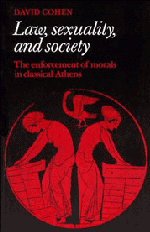Book contents
- Frontmatter
- Contents
- Preface
- 1 Introduction
- 2 Models and methods I
- 3 Models and methods II
- 4 Public and private in classical Athens
- 5 The law of adultery
- 6 Adultery, women, and social control
- 7 Law, social control, and homosexuality in classical Athens
- 8 The prosecution of impiety in Athenian law
- 9 The enforcement of morals
- Bibliography
- Index
- Frontmatter
- Contents
- Preface
- 1 Introduction
- 2 Models and methods I
- 3 Models and methods II
- 4 Public and private in classical Athens
- 5 The law of adultery
- 6 Adultery, women, and social control
- 7 Law, social control, and homosexuality in classical Athens
- 8 The prosecution of impiety in Athenian law
- 9 The enforcement of morals
- Bibliography
- Index
Summary
In classical Athens the law punished intentional homicide with death or perpetual exile. In addition, statutes clearly distinguished various forms of voluntary and involuntary homicide, as well as killings in self-defense, and described the various courts which tried such cases. In a number of its central features such a statutory scheme differs little from the treatment of homicide in most Western legal systems up to the contemporary period. Classical scholars and historians of Greek law have sometimes argued, however, that these provisions were “primitive,” in important respects. They point out, for example, that Athenian offenses fell into two procedural categories: the dike, or private suit, prosecutable by only the injured party, and the graphe, or public indictment, prosecutable by any citizen. The action for homicide belonged to the former. This categorization, they argue, shows that Athenian homicide law had not yet fully evolved out of the more “ primitive ” stage of self-help. Homicide, it is often concluded, was not of central concern to the state, but rather primarily involved the family.
Such explanations rely upon questionable assumptions involving evolutionary models of societal and institutional development. More generally, they also reveal the weakness of an unexamined positivist approach to legal institutions which asks only what the relevant statutes provide.
- Type
- Chapter
- Information
- Law, Sexuality, and SocietyThe Enforcement of Morals in Classical Athens, pp. 14 - 34Publisher: Cambridge University PressPrint publication year: 1991

